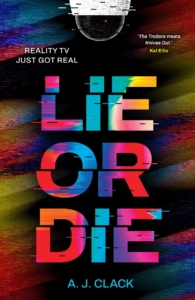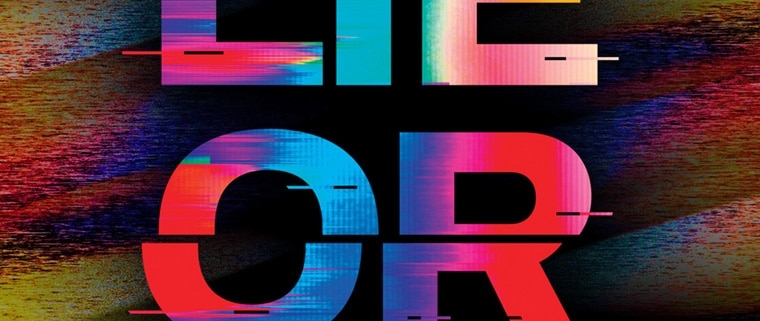Lie or Die by A.J. Clack
A.J. Clack offers some insight into our relationship with reality TV and how it inspired her novel, Lie or Die.

Is it time to face reality?
Reality television is the tv genre that many love to hate. Ask most people and they will screw up their face and shake their heads, vehemently denying committing any of their precious viewing time to such mediocrity.
But the viewing figures say something very different. For decades this type of show has dominated our TV channels and created many a TV celebrity from within its unscripted folds. We have to face the fact that in an industry led by ratings, reality TV simply wouldn’t exist without us, the reality hungry viewing public. We have become a nation fascinated with watching the normal person succeed or fail in front of our eyes – the harder the fall, the better the ratings. Reality shows give us an interactive experience in which we, the viewer, get to decide who will reach the dizzy heights of celebrity and those who won’t. We literally hold their future in our hands.
Lie or Die explores whether such power may have gone to our heads.
Lie or Die is inspired by my time working as a Production Manager for Fountain Television Studios in Wembley, the biggest TV studio in Europe. It was my job to oversee the shows that came in, working closely with each production to make sure they had the crew, equipment, facilities, hospitality and celebrity care they required. I worked on a number of shows and with a great deal of celebrities, directors and crew giving me quite a thorough and unique insight into the world of TV and celebrity. My (now) husband worked on all the reality shows, from Big Brother, X Factor to I’m a Celeb so I had a real insight into reality TV from the inside.
I love reality television. I’m a born people watcher and am fascinated by human interactions and behaviour. Watching the genre grow into the huge machine it’s become I started to look more closely at the cult of celebrity and the perception of fame – how we see it, how we get it and as an audience how we play a fundamental part in deciding the fate of reality show contestants. It led me to ask the question – what lengths would you be willing to go to for fame and celebrity and who, if anyone, are the real monsters behind reality television.
The idea came from this change in the way we see celebrity and how in today’s world being famous has become a career path. Celebrity is no longer for the chosen few, the most beautiful, the strongest, the most talented. Reality TV has shattered the illusion that fame is a construct for the minority, making celebrity achievable for anyone – doing anything. At its core it’s non-judgemental and inclusive and has had a huge impact on raising awareness and diversity on television. Now anyone can apply, and all have an equal chance of winning.
There have been many discussions about mental health issues surrounding the participants of reality Tv before, during and after the show which have raised questions about responsibility and ownership. Production companies have worked hard to develop a safe and structured environment for their cast members while preparing them for the volatile and unpredictable world of social media.
But while we all talk about the effect such shows have on the mental health of its contestants, not once do we open the discussion up and make it real. We never turn the camera around and look inwards. What is it with our society and its age-old fascination with pitting man against man and revelling in their rise and fall? From the Gladiatorial events of the Romans, right up to present day and reality shows like Big Brother, Love Island, I’m a Celebrity, we love to watch and participate in the rise of our chosen hero and the fall of their enemy.
The original game Mafia began as a psychology department classroom exercise in the 1980’s – a social deduction game created by Dimitri Davidoff – the idea of an informed minority and an uninformed majority, in this case, Mafia players hidden within innocent Citizens. The games construct has been adapted throughout the years, being the basis for many games, the most well-known being Among Us and the BBC TV Show, The Traitors. It’s a game a group of my friends have enjoyed playing for years and I always wondered what would happen if someone decided to take it to its ultimate and most extreme form.
From this came the idea of a Mafia inspired murder-mystery game show and with my background it seemed natural to place it in a reality TV setting. I wanted to explore the effects of reality television, the perception of fame and the cult of celebrity, and ask the question should we, the viewer (and the reader) turn the camera on ourselves? Should we start to take ownership of our behaviour and look more closely at our interaction with these shows? And do we have some responsibility for the wellbeing of their cast members, the real people behind the celebrity persona’s we helped to create? Those ‘real’ personalities who we all love to love and especially love to hate.
I think it’s most certainly worth starting the discussion.




